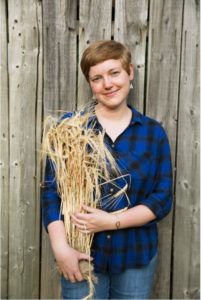January 10, 2020
By Michelle Pelletier Marshall, GAI Media
Jess Newman is an accomplished woman. While she has done amazing things at Anheuser-Busch as their director of Agricultural Procurement & Sustainability since 2017, she has been on the path of driving change for years. With two master’s degrees – an MBA from MIT Sloan and a Masters in Public Administration (MPA) from the Harvard Kennedy School of Government – and pre-graduate work that spans positions with the Consultative Group on International Agricultural Research in Nairobi, the Ecologic Institute in Berlin, the United Nations Food and Agriculture Organization in Rome, management consulting firm Booz & Company in Cleveland, and the New York City Mayor’s Office of Sustainability, it’s safe to say that Newman is passionate about agriculture and sustainability in our global food system. In 2018, she was featured in Forbes 30 Under 30 list, a setting which has been dubbed “the world’s greatest gathering of young entrepreneurs and game-changers.”
 Based in barley country in Idaho Falls, Idaho, Newman leads a team of 15 agronomists who support Anheuser-Busch’s approximately 1,000 direct contract barley, rice, and hop farmers in Idaho, Montana, North Dakota, Minnesota, Oregon, Washington, Arkansas, and Missouri. Their customers are Anheuser-Busch’s vertically owned grain elevators, malt plants, and rice mill. They also work closely with Anheuser-Busch’s barley breeding team and seed operations. The Agronomy Team’s mission is to be trusted crop advisors supporting conventional and organic growers with agronomic and sustainability advice and projects.
Based in barley country in Idaho Falls, Idaho, Newman leads a team of 15 agronomists who support Anheuser-Busch’s approximately 1,000 direct contract barley, rice, and hop farmers in Idaho, Montana, North Dakota, Minnesota, Oregon, Washington, Arkansas, and Missouri. Their customers are Anheuser-Busch’s vertically owned grain elevators, malt plants, and rice mill. They also work closely with Anheuser-Busch’s barley breeding team and seed operations. The Agronomy Team’s mission is to be trusted crop advisors supporting conventional and organic growers with agronomic and sustainability advice and projects.
“When we say agriculture is our business – we mean it!” said Newman. “We are one of the few companies, and the only brewer, that is completely vertically integrated at the farm level. My team of agricultural experts are co-located in our growing communities and help generate more than $300 million annually directly into growers’ pockets.”
After two and a half years on the job, Newman said “The most important thing I’ve learned is that growers and farm conditions are heterogeneous across—and sometimes even within—regions. Projects must be closely tailored to local circumstances and meet the unique needs of growers. Our approach must be holistic.”
To that end, Newman’s team has led several key Anheuser-Busch initiatives, including Michelob ULTRA Pure Gold Contract for Change, a program to help first-time organic barley growers begin the transition; a partnership with Indigo Agriculture to purchase rice grown with specific environmental attributes; and the company’s ambitious (and holistic) 2025 Sustainability Goals to ensure 100 percent of direct growers are skilled, connected, and financially empowered, among other initiatives.
Women in Agribusiness* caught up with Newman in between her travels to get more insight on her being an agent of change.
1.) You have an impressive list of degrees and experience in agriculture – and a steadfast mission to use the knowledge to make a difference in the sector. What is the impetus behind your passion for agriculture?
As someone who didn’t grow up on a farm, I often get asked how I ended up working in agriculture! The first reason goes back to my childhood – I am the daughter and granddaughter of master gardeners, so I spent a lot of time in the dirt. I entered the industry professionally by chance in university when I took a summer internship assessing agricultural projects in Kenya and Uganda for the Consultative Group on International Agricultural Research (CGIAR). I loved working with growers and was motivated by the unique challenges facing our global food system. We will always need food and farmers, and the choices we as a society make about how we treat farmers and what we want agriculture to look like in the future are weighty questions that will impact millions of people. I want to be part of shaping that future.
2.) You and your team are tasked with the strategy and execution for Anheuser-Busch’s ambitious 2025 Sustainability Goals. What does this entail, and what progress have you made?
Anheuser-Busch’s 2025 sustainability goal for agriculture is that 100 percent of our direct growers will be skilled, connected, and financially empowered. This language is pretty different from most Consumer Packaged Goods (CPG) companies’ agricultural sustainability goals. The reason is that our global parent company, AB InBev, works directly with over 30,000 farms globally. Our goal needs to be flexible enough to apply to radically different grower bases – for example, in Uganda and Oregon. My team’s task has been determining what skilled, connected, and financially empowered means for our U.S. growers, developing a strategy, and executing it. The best way I can describe our goal is this: we want to be a partner setting our growers up for success. For example, a skilled U.S. grower has access to a high-yielding, A-B approved crop variety; a variety-specific crop protocol with nutrient recommendations; at least two on-farm technical visits from their A-B agronomist annually; and technical and financial support on soil health, nutrient optimization, and water optimization. We need to execute all these tasks, measure them, and track the eventual impact they have on productivity, soil health, water quality, water quantity, grower profitability, etc. We’re on the journey!
3.) You spoke on Anheuser-Busch’s Contract for Change to support transitional producers at our Fall 2019 Organic & Non-GMO Forum in Minneapolis. Can you give an overview of this contract and the impact it is having?
Sure! Anheuser-Busch is the first brewer to introduce a USDA certified organic beer with national distribution, Michelob ULTRA Pure Gold. It has been received extremely well since the launch in early 2018. To secure our organic barley supply to meet this demand, we need to convert new acres. This is why we launched Contract for Change, a program that leads the beer industry in the brewing of organic beer and helps our conventional barley growers try organic production for the first time. These are four- to six-year contracts spanning the entire transition period. We commit to purchasing all transitional barley, and the first year of organic barley production. We are paying a premium for transitional barley and organic barley. My Agronomy Team will provide technical support to the participating growers. Our goal was to design a contract that addresses the main hurdles of organic conversion – uncertain future markets, financial hardship during the three-year transition, and a lack of on-the-ground resources and support. Our pilot in crop year 2019 in Idaho was a success, and we are actively recruiting additional growers for crop year 2020 now.
4.) Anheuser-Busch is the world’s largest brewery but remains very focused on agriculture. Please explain more on how your initiatives center around sharing the risk of trying new practices and technologies while still being a win-win for growers.
Anheuser-Busch is proud to be deeply vertically integrated into agriculture for our key brewing crops. On the barley side, we are vertically integrated from seed to sip. We own a barley breeding facility, seed plants, grain elevators, malt plants, and breweries. We also own a hop farm in Bonners Ferry, Idaho, and a rice mill in Jonesboro, Arkansas. We directly contract barley, rice, and hops with more than 1,000 American farmers. One of our key goals in our sustainability work with growers is to prove the environmental and financial return of new practices and technology to give growers the comfort and confidence for wider adoption. For example, we have worked closely with the University of Idaho and Montana State University to prove the water savings, energy savings, and ROI of low elevation sprinkler applications (LESA) pivots in different barley rotations. We have new projects coming up for 2020 to play the same role for alternate wetting and drying irrigation practices in rice growing.
5.) What technology or innovation are you and your team most excited about or see as the biggest game changer?
We are most excited about the potential for practice, yield, and quality data to deliver actionable insights to our growers and drive on-farm decisions and optimization. While there are many farm management platforms out there, there isn’t one industry leader yet, and usage of data-driven platforms remains patchy across grower demographics. The power of all that data is still largely untapped, which is why we are working with our barley grower partners to adopt and refine our SmartBarley app. The platform has the potential to significantly help our grower partners and already has proven to be a success.
6.) How has being a woman in agribusiness helped shape your team, your initiatives and goals, and the support you receive from Anheuser-Busch?
Brewing and agriculture are primarily male-dominated industries, but change is happening. Anheuser-Busch’s support of leaders from underrepresented groups is strong and growing every year. We know we have a representation gap, and we are working to close it. We are proud that one in four people on the Anheuser-Busch Agronomy Team are women, which is uncommon in our industry. I don’t think being a female leader has changed my team’s goals and initiatives, but I’ll have to reflect on that more. I try not to dwell on my differences from others in the industry. I belong at any table I sit at, as do the women on my Agronomy Team. Anyone who doubts that does so at their own peril!
About Jess Newman
 Jess Newman is director of U.S. agronomy at Anheuser-Busch in their Procurement & Sustainability function. Her team of crop scientists is responsible for all barley, hops, and rice purchased directly from American farmers. The Agronomy Team is responsible for the strategy and execution of A-B’s sustainability goals for ag. Newman is based in Idaho Falls, Idaho and travels frequently to support her agronomists in different states. She worked at the United Nations Food and Agriculture Organization, Ecologic Institute, New York City Mayor’s Office of Sustainability, Booz & Company, and the Consultative Group on International Agricultural Research. She holds a B.A. from Harvard, MPA from Harvard Kennedy School of Government, and an MBA from MIT Sloan School of Management.
Jess Newman is director of U.S. agronomy at Anheuser-Busch in their Procurement & Sustainability function. Her team of crop scientists is responsible for all barley, hops, and rice purchased directly from American farmers. The Agronomy Team is responsible for the strategy and execution of A-B’s sustainability goals for ag. Newman is based in Idaho Falls, Idaho and travels frequently to support her agronomists in different states. She worked at the United Nations Food and Agriculture Organization, Ecologic Institute, New York City Mayor’s Office of Sustainability, Booz & Company, and the Consultative Group on International Agricultural Research. She holds a B.A. from Harvard, MPA from Harvard Kennedy School of Government, and an MBA from MIT Sloan School of Management.
*This article originally appeared in GAI sister publication, the Women in Agribusiness Quarterly Journal, Winter 2020, V6i1. Reprinted with permission.
~ Michelle Pelletier Marshall is managing editor for Global AgInvesting’s quarterly GAI Gazette magazine and an occasional contributor to GAI News. She can be reached at mmarshall@globalaginvesting.com.

Let GAI News inform your engagement in the agriculture sector.
GAI News provides crucial and timely news and insight to help you stay ahead of critical agricultural trends through free delivery of two weekly newsletters, Ag Investing Weekly and AgTech Intel.




